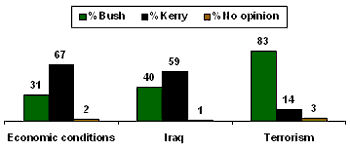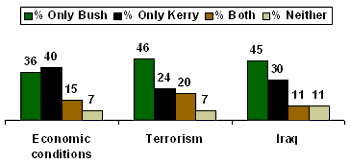GALLUP NEWS SERVICE
PRINCETON, NJ -- According to a recent CNN/USA Today/Gallup survey, 39% of likely voters say that among the three issues presented in the poll, the economy is the most important issue to their votes for president. Another 28% cite terrorism, while 22% name the situation in Iraq.
Thinking ahead to the elections for president, if you had to choose, which of the following issues will be most important to your vote for president – [ROTATED: economic conditions, terrorism, (or) the situation in Iraq]?
|
|
|
|
ALL EQUALLY (vol.) |
|
|
|
|
|
% |
% |
% |
% |
% |
% |
% |
|
|
Likely Voters |
|||||||
|
2004 Apr 16-18 |
39 |
28 |
22 |
8 |
1 |
1 |
1 |
|
Registered Voters |
|||||||
|
2004 Apr 16-18 |
43 |
25 |
22 |
8 |
1 |
1 |
* |
|
National Adults |
|||||||
|
2004 Apr 16-18 |
44 |
26 |
20 |
7 |
1 |
1 |
1 |
Voters who cite the economy and Iraq are more likely to vote for Sen. John Kerry than President George W. Bush, while voters who cite terrorism prefer Bush to Kerry. Among all likely voters, Bush enjoys a 51% to 46% lead.
| Support for Candidates Compared by Which Issue Most Important Based on Likely Voters |
 |
Among likely voters who cite economic conditions as the most important issue to their votes, 67% say they will vote for Kerry and 31% for Bush. Kerry's lead among voters who cite Iraq as the most important issue is smaller, 59% to 40%. Among voters naming terrorism, Bush leads overwhelmingly, 83% to 14%.
The poll, conducted April 16-18, also finds that significantly more Americans say Bush would do a good job in handling terrorism and the situation in Iraq than say that about Kerry, while slightly more people say Kerry than Bush would do a good job with the economy.
When asked specifically who would do a better job on each of the three issues, 40% of likely voters say "only Kerry" would do a better job on the economy, while 36% say "only Bush." On the other two issues, the voters favor Bush -- by 46% to 24% on terrorism and by 45% to 30% on Iraq.
| Who Would Better Handle the Issues? Based on Likely Voters |
 |
| Most Important Issue |
Voters who say that "only Bush" or "only Kerry" would do a good job vote overwhelmingly for that candidate. However, for both Iraq and terrorism, Kerry tends to get the benefit of the doubt among the people who see no difference in how the two candidates would handle the issues. Voters who say that "both" candidates would do a good job or that "neither" candidate would do a good job, are more likely to vote for Kerry than Bush.
On the economy, the pattern of support is somewhat different. On this issue, Bush tends to get the benefit of the doubt. Again, those who say only one candidate would do the better job vote overwhelmingly for that candidate. But those who say "both" candidates would do a good job vote strongly for Bush, while those who say "neither" split about evenly between the two candidates.
Another way to read the results is that Kerry voters are more likely than Bush voters to say that Iraq and especially the economy are the major issues, and that Kerry can do at least as well or better than Bush on these issues. Bush voters, by contrast, are more likely to say that terrorism is the major issue and that Bush can do the better job. Bush voters also think Bush can do a better job on Iraq, but they are more likely to say that terrorism, rather than Iraq, is the key issue.
While some critics have suggested that Bush does not have a good understanding of issues facing the country, the general public sees no difference between Kerry and Bush on this matter.
Do you think – [ROTATED: George W. Bush/John Kerry] – has a good understanding of the major issues facing the country today, or not?
|
Yes, |
No, |
No |
|
|
George W. Bush |
65% |
34 |
1 |
|
John Kerry |
62% |
32 |
6 |
Americans do see a difference, however, between Kerry and Bush on whether each "says what he means and means what he says." More people are likely to say that Bush rather than Kerry fits that statement (56% vs. 44%, respectively).
Do you think – [ROTATED: George W. Bush/John Kerry] – means what he says, and says what he means, or not?
|
|
Yes, does |
No, does not |
No opinion |
|
George W. Bush |
56% |
42 |
2 |
|
John Kerry |
44% |
44 |
12 |
Part of that difference may result from more people not knowing how to characterize Kerry. Twelve percent express no opinion. About the same percentage of Americans give a negative assessment to Bush and Kerry (42% and 44%, respectively), indicating skepticism about what they say.
Survey Methods
Results are based on telephone interviews with 1,003 national adults, aged 18 and older, conducted April 16-18, 2004. For results based on the total sample of national adults, one can say with 95% confidence that the margin of sampling error is ±3 percentage points.
Results based on likely voters are based on the subsample of 767 survey respondents deemed most likely to vote in the November 2004 general election, according to a series of questions measuring current voting intentions and past voting behavior. For results based on the total sample of likely voters, one can say with 95% confidence that the margin of sampling error is ±4 percentage points. The likely voter model assumes a turnout of 50% of national adults, consistent with recent presidential elections. The likely voter sample is weighted down to match this assumption.
For results based on the sample of 877 registered voters, the maximum margin of sampling error is ±4 percentage points.
In addition to sampling error, question wording and practical difficulties in conducting surveys can introduce error or bias into the findings of public opinion polls.
